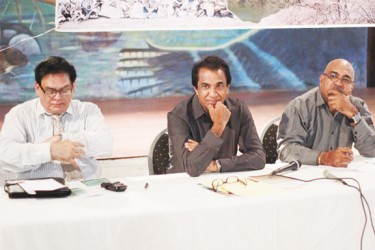“The tyranny of the text” has in many ways crippled Indian history in the Caribbean, Dean of the Faculty of Law, University of the West Indies at St Augustine Dr Kusha Haraksingh has said.
Giving the second lecture in a series commemorating the 175th anniversary of the arrival of East Indians in Guyana on Wednesday evening, Dr Haraksingh addressed the modern tribulations currently affecting the Diaspora, which parallel the problems of past generations.
He revealed that when he began his studies and travelled to Guyana in 1974 to examine the National Archives, he was overwhelmed with the information available. However, the context was at times missing, he added, touching on the notion that history is indeed written by the victors.

On familiarising himself with the historical archives, he noted that deeper research had to be done “because the people we were really interested in didn’t really write. Then we had to find another way to uncover the story and this was in what they did; in how they behaved; in what they built; in songs and dances the unconventional way of this time.”
Haraksingh said the study of the Diaspora’s connection to India had to be dealt with in a way that would familiarise Guyanese with their historical context. “Instead of having people write about us we had to try and write about ourselves,” he pointed out adding that the ambivalence felt by many within the Indian Diaspora was because history was not being written for the Diaspora. He said that in much the same way as names were registered incorrectly—and as a result many Indian names have been modified due to clerical error—history was allowed to be retold and modified.
However, “we are the baggage we carry…and with our baggage we can make a connection with the modern world,” he said.
Haraksingh said the Indian Diaspora is still reflective of a strong Indian heritage and that a connection with Indian identity is relevant 175 years later.
He said there was a mingling of the various Diasporas into one that is collectively Indian in nature.
Haraksingh mentioned that it was the late Dr Walter Rodney who inspired his interest in the historical accuracy of indentured servants.
He said that in the modern context the struggles of the first indentured servants can be felt by the Diaspora who now too leave loved ones behind as they go in search of something better.
This globalisation of ideas that is continuously being shared due to the movement of people could even be seen in the recent election of the American President Barack Obama. Haraksingh said that just as immigration has changed the Indian Diaspora it has also changed many others noting that President Obama is of Kenyan ancestry. He also mentioned that the American president has often credited Mahatma Gandhi’s revolutionary vision of non-violent resistance.
The Commemorative Lecture Series is part of the Culture Ministry’s initiatives to bring thought-provoking dialogue to the public with the hope of imbuing a sense of history to younger generations. Past lectures have seen topics such as the 1763 Slave Rebellion and the impact of Caribbean artists throughout the world. The lectures are being hosted at the Umana Yana.





